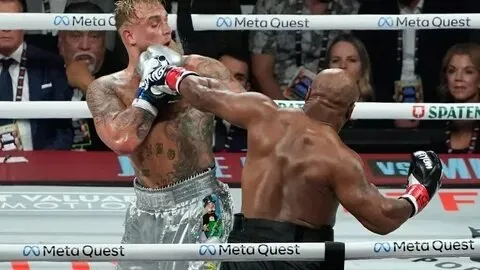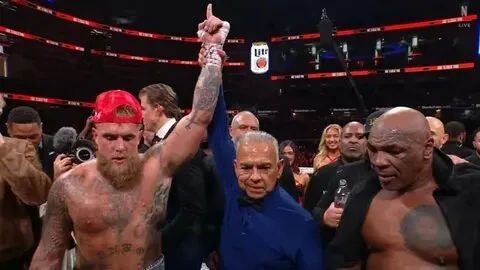The highly anticipated boxing match between Mike Tyson and Jake Paul has stirred significant public discourse, breaking records with over 108 million live viewers but leaving many deeply dissatisfied. While the event set a new benchmark for viewership, its execution—both in the ring and on the broadcast—faced sharp criticism, highlighting the tension between boxing as a sport and its transformation into a commercial spectacle.
Disappointment in the Ring

Fans eagerly anticipated a fiery clash between the legendary Tyson and the rising influencer-turned-boxer Paul. Instead, many viewers felt the bout lacked authenticity and competitive spirit. Observers pointed out the “light punches” and a noticeable absence of tension, leading to widespread allegations that the fight was staged for commercial purposes rather than to honor the sport’s competitive roots.

Critics have lamented the shift in boxing’s focus, comparing the Tyson-Paul match unfavorably to legendary rivalries like Muhammad Ali vs. Joe Frazier or Manny Pacquiao vs. Juan Manuel Marquez. The lack of genuine confrontation has fueled concerns that modern boxing is prioritizing spectacle over substance.
Technical Challenges and Legal Fallout

Adding to the disappointment were significant technical issues during the event’s broadcast on Netflix. Many viewers experienced lagging streams, lost connections, and outright inaccessibility. These disruptions overshadowed the historic scale of the event and prompted a class action lawsuit against Netflix, accusing the platform of failing to deliver on service quality promises.
Netflix has acknowledged the technical glitches and committed to improving its infrastructure for future events, but the backlash raises serious questions about the platform’s capability to host high-profile live broadcasts. The lawsuit underscores growing consumer frustration with streaming services that fall short of expectations during major events.
The Commercialization of Boxing

The Tyson-Paul event epitomizes the growing commercialization of boxing, a trend that has sparked debate among fans and purists. Iconic fights of the past, driven by athletic rivalry and skill, are increasingly being replaced by matchups designed to maximize profits through celebrity appeal, advertising, and sponsorships.
While such events bring boxing to a broader audience, they also risk alienating long-time fans who value the sport’s authenticity. The Tyson-Paul match, heavily criticized for its lack of substance, underscores this tension. If fights prioritize entertainment over competition, the sport’s integrity may be at risk.
The Future of Boxing
The controversy surrounding the Tyson-Paul fight raises a pivotal question: Can boxing strike a balance between tradition and modern commercial realities? While big-name matches generate revenue and attract new fans, maintaining the sport’s credibility will require organizers to ensure competitive integrity and improve event quality.
As boxing continues to evolve, its stakeholders—fighters, promoters, and platforms—must navigate these challenges carefully. The Tyson-Paul event serves as both a cautionary tale and an opportunity for the sport to reflect on its identity in an increasingly commercialized world. For boxing to thrive, it must honor its roots while adapting to contemporary demands, ensuring that the spectacle does not come at the expense of its soul.
4o